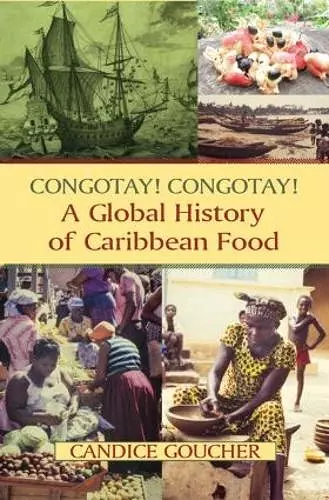Congotay! Congotay! A Global History of Caribbean Food
Format:Hardback
Publisher:Taylor & Francis Ltd
Published:28th Feb '14
Currently unavailable, and unfortunately no date known when it will be back
This hardback is available in another edition too:
- Paperback£46.99(9780765642165)

Since 1492, the distinct cultures, peoples, and languages of four continents have met in the Caribbean and intermingled in wave after wave of post-Columbian encounters, with foods and their styles of preparation being among the most consumable of the converging cultural elements.
This book traces the pathways of migrants and travellers and the mixing of their cultures in the Caribbean from the Atlantic slave trade to the modern tourism economy. As an object of cultural exchange and global trade, food offers an intriguing window into this world. The many topics covered in the book include foodways, Atlantic history, the slave trade, the importance of sugar, the place of food in African-derived religion, resistance, sexuality and the Caribbean kitchen, contemporary Caribbean identity, and the politics of the new globalisation. The author draws on archival sources and European written descriptions to reconstruct African foodways in the diaspora and places them in the context of archaeology and oral traditions, performance arts, ritual, proverbs, folktales, and the children's song game "Congotay." Enriching the presentation are sixteen recipes located in special boxes throughout the book.
*** Winner of the Gourmand World Award for best book on Caribbean cuisine and culture 2015 ***
"This excellent book introduces Caribbean history to world historians in a truly delightful way. Using food as a way into a multitude of world historical processes, from enslavement to resistance, from sexuality to globalization, Candice Goucher expertly cooks up the perfect regional history of Caribbean social life. Replete with modern and historical recipes, this book ought to be required reading for anyone with an interest in either the Caribbean or in food (and the recipes are simple too!)." -- Alan Karras, University of California, Berkeley
"This richly textured and lively written volume offers profound insights into the significance of food in world history and human experience, making me hungry for Caribbean food." -- Yong Chen, University of California, Irvine
"As a world historian I appreciate her attention to cultural detail on both sides of the Atlantic, and her elegant embrace of the histories of women and ordinary people as active participants in the construction of regionalized and global identities through the production and consumption of food. As a Latin American historian I appreciate her success in communicating the key notions of cultural interaction and blending to the world historical community. Finally, as a chef I appreciate the historical recipes and stories that lay behind that most basic of human activities: cooking and eating." -- Rick Warner, Wabash College
"Candice Goucher brings us a fascinating and compelling read. The scope of her work borders on remarkable. Beginning long before the middle passage, she peels back the layers and the cross-hatchings of cultures that created the foods of West African peoples. But the Caribbean is her focus and her story is not one we've heard before. ... Read Congotay! Congotay! for the sheer pleasure of discovery." -- Lynne Rossetto Kasper, Host, The Splendid Table from American Public Media
"Lyrically written and thoroughly engrossing, Congotay! Congotay! convincingly places foodways at the center of conversations about language, material culture and gender. By intertwining her own extensive research with a masterful synthesis of current scholarship on African disaporic cultural exchanges and globalization, Goucher delivers a significant global story in this marvelous history of Caribbean households." -- Laura Mitchell, University of California, Irvine
"Goucher provides a comprehensive history of Caribbean food in this slim volume. This is the first book about Caribbean cuisine focusing on the peoples of multiple countries who met on these islands and intermingled through forced circumstance. Not only does Goucher cover the major ingredients and dishes, she also addresses the effects of the cod fishing industry, slavery, the sugar industry, and Chinese and Indian immigration on the establishment of this multicultural cuisine. The book's strength is the author's use of primary sources to reconstruct African foodways in the Caribbean and their manifestations in storytelling, music, folklore, and children's games. Historians, anthropologists, and culinarians will appreciate this book. Highly recommended. All academic, professional, and general collections." -- Choice
"Food is obviously the focus of this book, and Goucher's enthusiasm for the subject flows through every page. Recipes for everything from pepper-pots to mojitos are included, as are more general descriptions of countless additional foods. But her use of food as an entry point to crucial themes like imperialism, slavery, migration, gender, sexuality, resistance, and globalization is extremely significant. Her knowledge of the scholarly debates on these subjects is impressive, and she makes a number of important contributions." -- Dave Eaton, Grand Valley State University
"In Congotay! Congotay! the subject matter is treated respectfully and honestly. It is an anthropological history that manages to avoid an overtly anthropological gaze. The book weaves socio-historical complexities of race, ethnicity, and class while managing to maintain its focus on the Caribbean and frankly the dominant African and Asian cultural and culinary influences. It is a welcome addition to foodways studies literature on Caribbean food, globalization, and colonialism and will be accessible and engaging for everyone from students to advanced researchers." -- Rachel Finn, Digest: a Journal of Foodways and Culture
ISBN: 9780765642158
Dimensions: unknown
Weight: 498g
264 pages